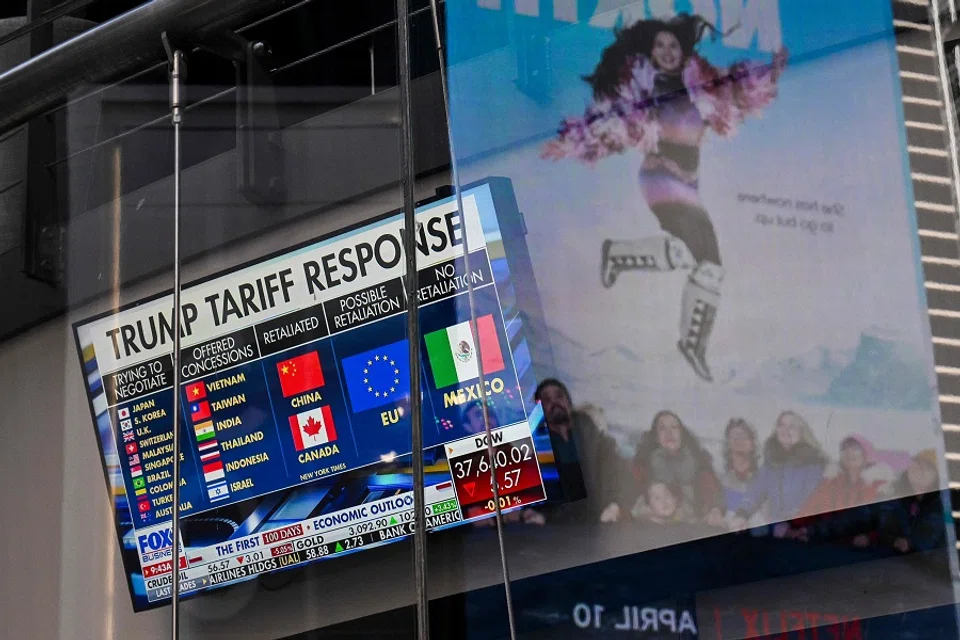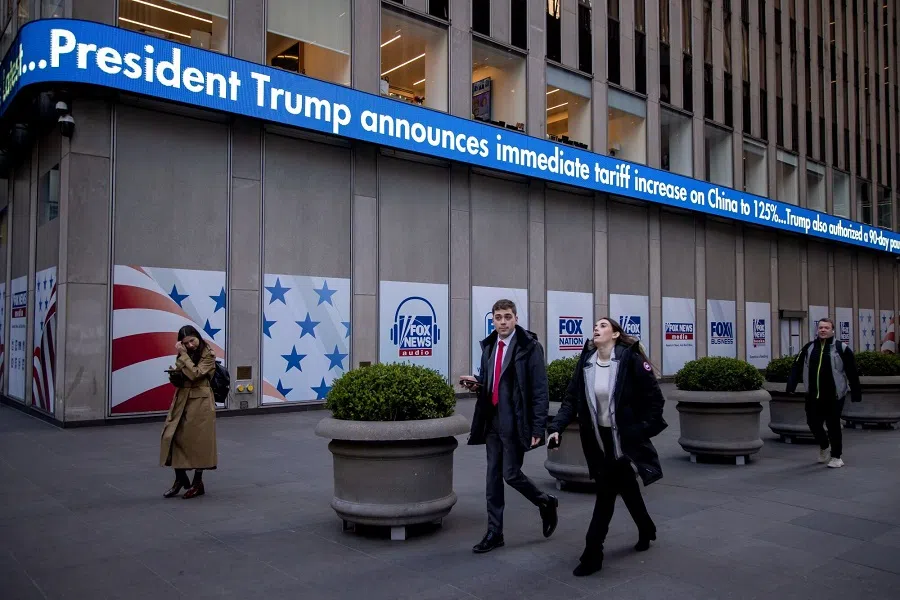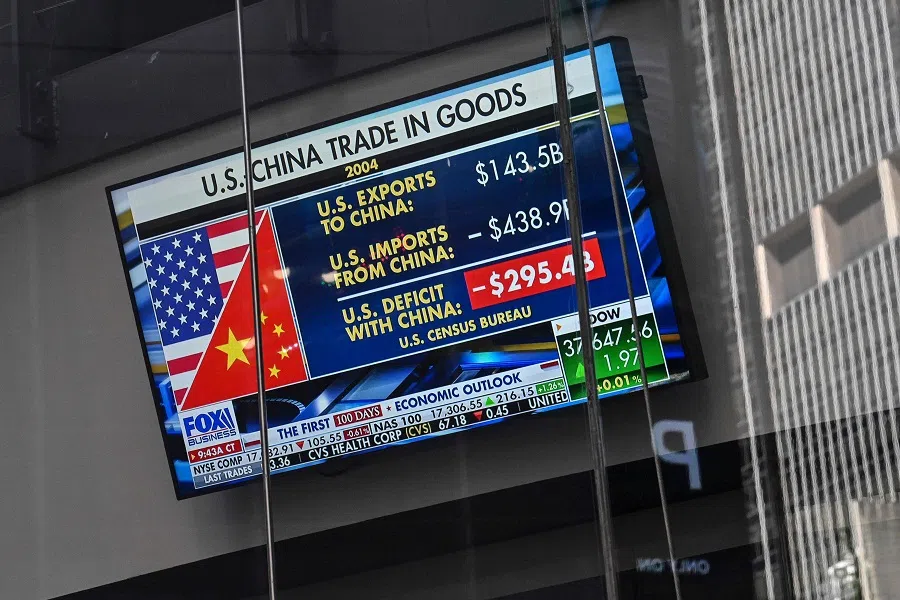Trump’s tariffs running out of steam?
US President Donald Trump’s global tariffs have not gone the way he expected, with China not buckling under pressure and prompting the US to initiate dialogue, while allies such as the UK are not taking sides. Lianhe Zaobao correspondent Yu Zeyuan examines how the US is flagging in its efforts to keep up its tariffs in the face of resistance.

Recently, US President Donald Trump and his aides have repeatedly extended an olive branch to China, seeking dialogue. However, China has yet to show any indication of accepting Trump’s “goodwill”. The US’s urgency for dialogue and China’s lukewarm response indicate that Trump’s latest round of tariffs against China might be faltering.
Trump claimed during a press conference at the White House on 17 April that China had reached out to negotiate with the US over tariffs, asserting that both sides have remained in contact since the US imposed additional tariffs on Chinese goods. He also expressed optimism about reaching an agreement, suggesting that a deal could be finalised within three to four weeks. On 18 April, Trump again told the media that “nice conversations” are ongoing between the US and China.
US Treasury Secretary Scott Bessent also advocated for dialogue between China and the US, expressing “confidence” in the relationship between Trump and Chinese President Xi Jinping. US Commerce Secretary Howard Lutnick also claimed that the only thing Trump wants is a one-on-one chat with Xi.
... China has not offered a positive response, which suggests that the US is currently more eager to negotiate with China and alleviate the impact of the tariff war on the US.
Secret talks?
It is unclear whether secret talks on tariffs are occurring between China and the US. But it is clear that Trump and his aides have been requesting for prompt dialogue with China even up to a summit between the two leaders. Yet China has not offered a positive response, which suggests that the US is currently more eager to negotiate with China and alleviate the impact of the tariff war on the US.

Trump initiated “Liberation Day” tariffs on 2 April and brandished the tariff weapon against the world, seemingly believing that this would force other countries into submission and allow him to reap global benefits while simultaneously striking a blow against the Chinese economy.
However, things did not turn out the way he expected — not only were traditional allies such as the European Union (EU), Japan and South Korea resistant, but China also retaliated with unprecedented resolve. Less than 20 days into the tariff war, the global economy has already been affected, and the US is also beginning to experience difficulties.
The US stock market, bond market and dollar have all performed poorly recently. Trump has repeatedly attacked Federal Reserve chair Jerome Powell for not cutting interest rates, but Powell has held firm. If this situation continues, the impact on this year’s US Treasury bond issuance will be significant, making it even more difficult to address the US government’s budget deficit.
Although the potential inflationary effects of the tariff war have yet to be seen, Trump’s economic policies are already generating widespread discontent among Americans. A CNBC All-America Economic Survey released on 19 April showed that Trump’s approval rating on economic issues stands at 43%, while his disapproval rating is at 55%. Furthermore, 49% of the respondents believe the economy will get worse over the next year.
If the tariff war escalates, a reversal of the US services trade surplus with China is also possible. Moreover, China could also weaponise its holdings of nearly US$800 billion in US Treasury bonds.
China’s resistance
Externally, China is not only holding its own against US tariffs, it is expanding its countermeasures to include banning the export of medium and heavy rare earth elements to the US, halting purchases of American agricultural products like soybeans, and suspending orders for Boeing aircraft, among others. If the tariff war escalates, a reversal of the US services trade surplus with China is also possible. Moreover, China could also weaponise its holdings of nearly US$800 billion in US Treasury bonds.

The tariff war would of course severely impact China’s exports to the US, affecting employment and the economic growth targets this year. However, after weighing the pros and cons and considering how various countries might react to Trump’s tariff war, China has decided not to be the first to compromise in negotiations. It is willing to bear losses and continue the tariff battle to see how long the US can hold out, ultimately aiming to end the war by staying in it.
The tariff war against China has already put pressure on US farmers, importers and tech giants like Nvidia. Although the US government recently banned Nvidia from exporting H20 chips to China, Nvidia’s CEO Jensen Huang visited Beijing last week, and emphasised that Nvidia would “unswervingly serve the Chinese market”. The Global Times commented that Huang’s emphasis on the Chinese market being a “very important market” could, to some extent, be seen as US companies’ indirect resistance to US government’s protectionist trade policies.
UK’s stance an example for US allies
Another effective strategy for the US is to rally allies and other countries against China. However, since Trump swung the tariff stick at most countries this time around, the US’s ability to unite allies to isolate China has been significantly diminished. The EU has plans to impose restrictions on some goods exported to the US in retaliation for the US’s tariff measures. As of now, no major economy in the world has publicly declared it would join the Trump administration’s tariff alliance against China — not even the US’s staunch ally, the UK, which is reluctant to get involved in this mess.
UK Chancellor of the Exchequer Rachel Reeves stated in an interview with The Daily Telegraph on 19 April that the UK believes cutting ties with China would be very foolish, and expressed support for the Chinese e-commerce platform Shein’s plans to list in the UK.
Reeves would be in Washington on 21 April to attend an international conference and hold talks with the US on trade agreements and other issues. By sending the message that the UK does not wish to isolate China ahead of her visit to the US, it is clear that the UK does not want to take sides in the China-US tariff war.
... Trump’s request to negotiate with China does not necessarily mean the US is “conceding”; rather, it is a tactical adjustment as a result of internal and external pressure.

The UK’s stance has the impact of serving as a model for other US allies. Many of these countries have close economic ties with China, and are clearly reluctant to join the US in economically isolating China. Moreover, not only would the US be unlikely to provide these countries with economic compensation, it may even turn around and impose tariffs on them.
Furthermore, since Trump re-entered the White House in January, his policies have been erratic and his stance inconsistent, making him seem even less reliable than during his first term. This has severely damaged the credibility of the US government. Even if some countries are pressured into reaching agreements with the Trump administration, who can guarantee that Trump would not switch tack at any moment? Hence, in the China-US tariff tussle, most countries — including traditional US allies — have preferred to wait and see rather than hastily jump on Trump’s bandwagon.
The fundamental reason why Trump’s tariff war against China is unlikely to reach its targets is because Trump and his advisers have overestimated the leverage the US holds, and underestimated China’s resilience and its counter impact. However, Trump’s request to negotiate with China does not necessarily mean the US is “conceding”; rather, it is a tactical adjustment as a result of internal and external pressure. In the long term, the various games between the US and China still persist.
This article was first published in Lianhe Zaobao as “特朗普的关税战打不下去了”.





![[Big read] When the Arctic opens, what happens to Singapore?](https://cassette.sphdigital.com.sg/image/thinkchina/da65edebca34645c711c55e83e9877109b3c53847ebb1305573974651df1d13a)